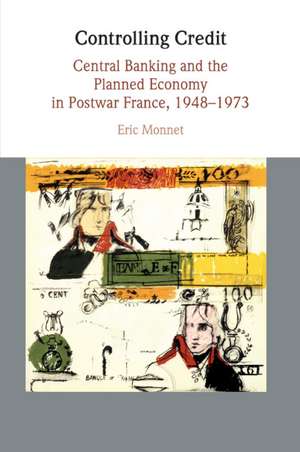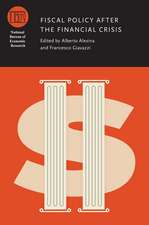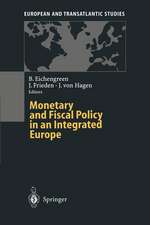Controlling Credit: Central Banking and the Planned Economy in Postwar France, 1948–1973: Studies in Macroeconomic History
Autor Eric Monneten Limba Engleză Paperback – 2 oct 2019
Toate formatele și edițiile
| Toate formatele și edițiile | Preț | Express |
|---|---|---|
| Paperback (1) | 338.80 lei 6-8 săpt. | |
| Cambridge University Press – 2 oct 2019 | 338.80 lei 6-8 săpt. | |
| Hardback (1) | 699.47 lei 38-45 zile | |
| Cambridge University Press – 14 noi 2018 | 699.47 lei 38-45 zile |
Din seria Studies in Macroeconomic History
-
![Teach Your Kids about Countries [Vol4 ]: Version Adaptada Al Castellano Actual Por Rafael Antunez y Raul Alonso](https://i3.books-express.ro/bs/9781480268180/teach-your-kids-about-countries-vol4.jpg) Preț: 61.51 lei
Preț: 61.51 lei -
 Preț: 167.96 lei
Preț: 167.96 lei -
 Preț: 95.31 lei
Preț: 95.31 lei -
![Teach Your Kids about Countries [Vol 25]: Version Adaptada Al Castellano Actual Por Rafael Antunez y Raul Alonso](https://i0.books-express.ro/bs/9781480268401/teach-your-kids-about-countries-vol-25.jpg) Preț: 61.51 lei
Preț: 61.51 lei -
 Preț: 53.96 lei
Preț: 53.96 lei -
![Teach Your Kids about Countries [Vol8]: Version Adaptada Al Castellano Actual Por Rafael Antunez y Raul Alonso](https://i2.books-express.ro/bs/9781480268227/teach-your-kids-about-countries-vol8.jpg) Preț: 61.70 lei
Preț: 61.70 lei -
 Preț: 125.81 lei
Preț: 125.81 lei -
 Preț: 64.79 lei
Preț: 64.79 lei -
 Preț: 131.58 lei
Preț: 131.58 lei -
 Preț: 86.92 lei
Preț: 86.92 lei -
 Preț: 95.96 lei
Preț: 95.96 lei - 9%
 Preț: 592.70 lei
Preț: 592.70 lei -
 Preț: 74.52 lei
Preț: 74.52 lei -
 Preț: 238.93 lei
Preț: 238.93 lei -
![Teach Your Kids about Countries [Vol 22]: Version Adaptada Al Castellano Actual Por Rafael Antunez y Raul Alonso](https://i2.books-express.ro/bs/9781480268371/teach-your-kids-about-countries-vol-22.jpg) Preț: 61.51 lei
Preț: 61.51 lei -
 Preț: 54.03 lei
Preț: 54.03 lei -
 Preț: 46.84 lei
Preț: 46.84 lei -
 Preț: 92.61 lei
Preț: 92.61 lei -
![Teach Your Kids about Countries [Vol2]: Version Adaptada Al Castellano Actual Por Rafael Antunez y Raul Alonso](https://i1.books-express.ro/bs/9781480268166/teach-your-kids-about-countries-vol2.jpg) Preț: 61.51 lei
Preț: 61.51 lei -
 Preț: 135.03 lei
Preț: 135.03 lei -
 Preț: 75.99 lei
Preț: 75.99 lei -
 Preț: 104.33 lei
Preț: 104.33 lei -
 Preț: 130.65 lei
Preț: 130.65 lei -
 Preț: 201.10 lei
Preț: 201.10 lei -
 Preț: 83.38 lei
Preț: 83.38 lei -
 Preț: 63.20 lei
Preț: 63.20 lei -
 Preț: 177.10 lei
Preț: 177.10 lei -
 Preț: 56.92 lei
Preț: 56.92 lei -
 Preț: 40.48 lei
Preț: 40.48 lei -
 Preț: 62.62 lei
Preț: 62.62 lei -
![Teach Your Kids about Countries [Vol13]: Version Adaptada Al Castellano Actual Por Rafael Antunez y Raul Alonso](https://i2.books-express.ro/bs/9781480268272/teach-your-kids-about-countries-vol13.jpg) Preț: 61.51 lei
Preț: 61.51 lei -
![Teach Your Kids about Countries [Vol 17]: Version Adaptada Al Castellano Actual Por Rafael Antunez y Raul Alonso](https://i2.books-express.ro/bs/9781480268326/teach-your-kids-about-countries-vol-17.jpg) Preț: 61.51 lei
Preț: 61.51 lei -
![Teach Your Kids about Countries [Vol 5]: Version Adaptada Al Castellano Actual Por Rafael Antunez y Raul Alonso](https://i4.books-express.ro/bs/9781480268197/teach-your-kids-about-countries-vol-5.jpg) Preț: 61.51 lei
Preț: 61.51 lei -
 Preț: 123.49 lei
Preț: 123.49 lei -
 Preț: 59.67 lei
Preț: 59.67 lei -
 Preț: 96.04 lei
Preț: 96.04 lei - 8%
 Preț: 470.07 lei
Preț: 470.07 lei -
 Preț: 96.45 lei
Preț: 96.45 lei -
 Preț: 55.99 lei
Preț: 55.99 lei -
 Preț: 69.21 lei
Preț: 69.21 lei -
 Preț: 72.83 lei
Preț: 72.83 lei -
 Preț: 208.23 lei
Preț: 208.23 lei -
 Preț: 88.56 lei
Preț: 88.56 lei -
 Preț: 51.36 lei
Preț: 51.36 lei -
 Preț: 93.90 lei
Preț: 93.90 lei -
 Preț: 51.11 lei
Preț: 51.11 lei - 20%
 Preț: 45.72 lei
Preț: 45.72 lei -
 Preț: 212.46 lei
Preț: 212.46 lei -
 Preț: 71.19 lei
Preț: 71.19 lei
Preț: 338.80 lei
Nou
Puncte Express: 508
Preț estimativ în valută:
64.83€ • 67.55$ • 53.68£
64.83€ • 67.55$ • 53.68£
Carte tipărită la comandă
Livrare economică 04-18 aprilie
Preluare comenzi: 021 569.72.76
Specificații
ISBN-13: 9781108400084
ISBN-10: 1108400086
Pagini: 352
Dimensiuni: 150 x 230 x 18 mm
Greutate: 0.47 kg
Editura: Cambridge University Press
Colecția Cambridge University Press
Seria Studies in Macroeconomic History
Locul publicării:New York, United States
ISBN-10: 1108400086
Pagini: 352
Dimensiuni: 150 x 230 x 18 mm
Greutate: 0.47 kg
Editura: Cambridge University Press
Colecția Cambridge University Press
Seria Studies in Macroeconomic History
Locul publicării:New York, United States
Cuprins
Introduction; Part I. Institutionalizing Credit: Introduction to Part I: chronology and methodology; 1. French credit policies before 1945; 2. The nationalization of credit from 1945 to the late 1950s; 3. Development then gradual de-institutionalization: the 1960s and 1970s; Part II. Managing Credit: 4. Monetary policy without interest rates. Domestic macroeconomic effects and international issues of credit controls; 5. Blurred lines. The two faces of Banque de France loans to the Treasury (1948–73); 6. Financing the postwar Golden Age. The Banque de France, 'investment credit' and capital allocation; 7. The rise and fall of national credit policies. Implications for the history of European varieties of capitalism and monetary integration; Conclusion.
Recenzii
'How central banks and governments used directed credit to positively influence post-World War II economic recovery and growth - and why similar policies do not work today - is one of the great unsolved mysteries of twentieth-century economic history. In this pathbreaking volume, Eric Monnet uses the French case to shed important new light on the question.' Barry Eichengreen, George C. Pardee and Helen N. Pardee Professor of Economics and Political Science, University of California, Berkeley
'Monnet's intensive study of the Banque de France during the Trente Glorieuses sheds new light on the development of credit policy in the decades before the central banking orthodoxy of the 2000s. It thus makes an important contribution to understanding the development of central banking in Europe and reminds us of the heterogeneity of central bank practice in the twentieth century.' Catherine Schenk, University of Oxford
'Controlling Credit is a valuable book and will remain an inescapable reference in the emerging literature about postwar central banking.' Stefano Ugolini, Journal of Interdisciplinary History
'Monnet's intensive study of the Banque de France during the Trente Glorieuses sheds new light on the development of credit policy in the decades before the central banking orthodoxy of the 2000s. It thus makes an important contribution to understanding the development of central banking in Europe and reminds us of the heterogeneity of central bank practice in the twentieth century.' Catherine Schenk, University of Oxford
'Controlling Credit is a valuable book and will remain an inescapable reference in the emerging literature about postwar central banking.' Stefano Ugolini, Journal of Interdisciplinary History
Notă biografică
Descriere
Monnet analyzes monetary and central bank policy during the mid-twentieth century through close examination of the Banque de France.


















